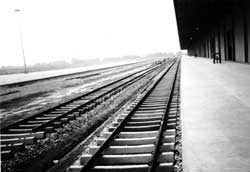 Inconclusive. A word that defines our political stance over the refugee deadlock with Bhutan. This is also the way long-winded bilateral negotiations with India always seem to end. The Beed is not surprised to note nobody seems to care. Why is it that we excel at bemoaning our landlocked geography while failing miserably at reducing the impact of its disadvantages?
Inconclusive. A word that defines our political stance over the refugee deadlock with Bhutan. This is also the way long-winded bilateral negotiations with India always seem to end. The Beed is not surprised to note nobody seems to care. Why is it that we excel at bemoaning our landlocked geography while failing miserably at reducing the impact of its disadvantages? The World Bank funded the dry port at Birgunj and things were chugging along nicely with the submission of management bids before everything stalled. The Indian government convinced the World Bank of the importance of having Indian firms as part of the Inland Container Depot (ICD) management, handing them a critical advantage against even the world's best companies who may want to manage the ICD.
Economics is driven by politics, not vice-versa. So while we play the finger pointing game, the Beed feels a little critical self-examination would not be amiss.
It is always a source of wonder that while the government seems unable to keep Nepalis out of local casinos, private businesses do an admirable job of doing just that with their tourist buses. The state of our tourism and transportation infrastructure is linked to transport entrepreneurs with their powerful connections. They are able to negotiate with the government on everything from insurance to route permits.
Domestic tourists should have better options than a choice between folding-seat-and-video coaches and prohibitively expensive airfares. In the Beed's opinion Nepali entrepreneurs would do well not to be so averse to expanding operations to India and Tibet. Imagine the benefits of a fleet of luxury coaches that ferry Buddhist pilgrims from Lhasa to Lumbini in comparative ease and comfort. And when we finally harness our hydropower we could have electric trains like the Japanese. China has been able to build efficient rail links, surely we can too.
When looking at transportation in Nepal the greatest problem we face is our fragmented approach. Some donors want roads in rural areas, others are busy building bridges. A few organisations are promoting environment friendly vehicles, some lobby for unadulterated fuel. Meanwhile the major players do all they can for strategic control of the largest piece of the Nepali transport pie. Is anyone looking at the bigger picture?
These elements will fit together if the business of transportation is regulated. There can be no room for cartels. The Nepali economy rests on exports and tourism, and the backbone of both is efficient transportation. Unfortunately, even as the Beed pontificates through this column, the heads of various government departments confer with each other ad nauseam with predictable results. Inconclusive.
(Readers can post their views or comments at [email protected])



